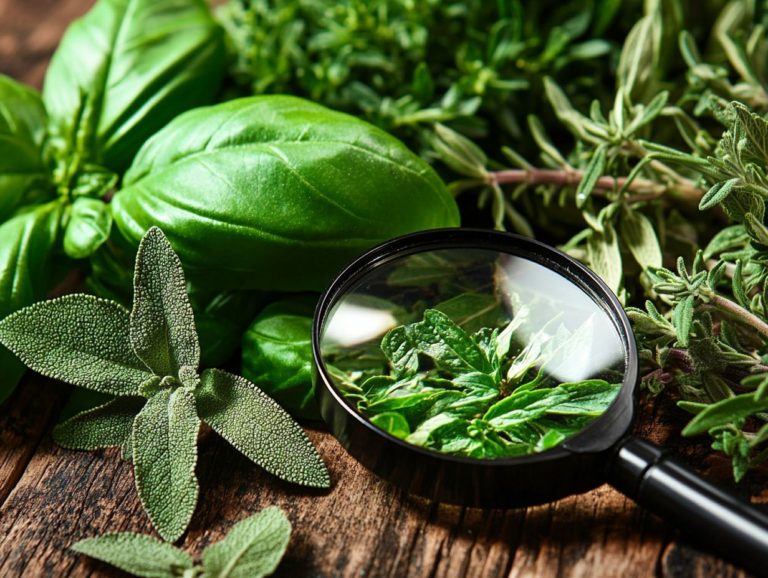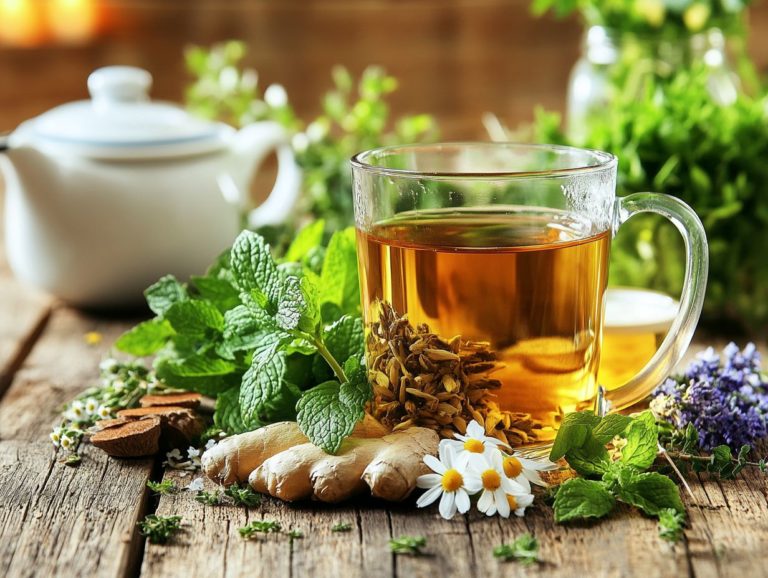How to Use Herbal Remedies Responsibly?
Herbal remedies have been revered for centuries, presenting a compelling natural alternative to regular medicine.
While these remedies can promote healing and enhance overall well-being, it’s essential to recognize the potential risks involved, including harmful side effects and interactions with other treatments.
Let s explore the amazing benefits of herbal remedies and learn how to use them wisely! This article outlines crucial guidelines for responsible use and clarifies common misconceptions, empowering you to make informed decisions about integrating these natural solutions into your health regimen.
Contents
- Key Takeaways:
- Benefits of Herbal Remedies
- Understanding the Risks of Herbal Remedies
- Choosing and Using Herbal Remedies Responsibly
- Common Misconceptions About Herbal Remedies
- Frequently Asked Questions
- What are herbal remedies and dietary supplements?
- How do I use herbal remedies responsibly?
- Can anyone use herbal remedies?
- Are there any potential side effects of using herbal remedies?
- How can I ensure the quality and safety of herbal remedies?
- Are there any precautions I should take when using herbal remedies?
Key Takeaways:

- Be informed about potential risks and side effects of herbal remedies by doing thorough research and consulting with a healthcare professional before use.
- Choose and use herbal remedies responsibly by adhering to recommended dosages and avoiding potential interactions with other medications, especially for pregnant women.
- Understand the benefits and limitations of herbal remedies, and be aware of common misconceptions to make informed decisions for your health.
What are Herbal Remedies?
Herbal remedies are natural treatments sourced from various parts of plants leaves, roots, flowers, and seeds that have been cherished for centuries in traditional medicinal systems like Ayurveda and Traditional Chinese Medicine. These herbal medicines often pack a punch with the main substances that help in healing that can promote health and alleviate certain conditions, making them appealing alternatives or complements to regular medicines.
It s crucial to ensure these remedies meet quality standards, especially when considering unlicensed herbal products that may not face the same rigorous scrutiny typically applied to pharmaceuticals.
Herbal remedies date back to ancient times! They ve been used for health and wellness long before modern medicine. The sources of these treatments encompass a rich variety of plants, many cultivated over centuries due to their remarkable healing properties.
People often use herbal remedies for many reasons, like easing digestive problems or managing stress and anxiety. The formal registration of traditional herbal products serves to validate their efficacy and safety; however, the lack of standardization across regions can raise some red flags regarding quality control.
To navigate these challenges, it s essential to seek out reputable sources and verified products, ensuring you can enjoy the potential benefits of herbal medicine without compromising your safety.
Benefits of Herbal Remedies
Herbal remedies have garnered significant attention for their potential to enhance overall health, bolster the immune system, and serve as effective dietary supplements.
You may find that many users share positive experiences, reporting improvements in energy levels and enhanced mental clarity. This illustrates the diverse effects that various herbal preparations can have on health.
However, it’s essential to remember that the effectiveness of these remedies often hinges on the quality of the main substances that help in healing and the specific plant parts utilized.
Natural Healing and Potential Health Improvements
Natural healing with herbal medicines has been a time-honored practice, offering potential health benefits for various ailments that regular options might not address as effectively. Remedies like Kava have shown promise in easing anxiety, while St. John’s Wort is frequently sought after for mild depression. These alternative treatments highlight how you can achieve beneficial outcomes while pursuing holistic health solutions.
You might also find herbs like Turmeric, renowned for its anti-inflammatory properties, helpful in managing chronic pain conditions such as arthritis. Likewise, Peppermint is commonly used to relieve digestive issues, showcasing the remarkable versatility of herbal approaches.
As more individuals lean toward natural options, integrating herbal therapies with regular treatments could pave the way for a more comprehensive healthcare strategy. This approach emphasizes a patient-centered philosophy, allowing for individualized care that honors personal preferences and nurtures overall well-being.
Don t wait! Start your journey into herbal remedies today!
Understanding the Risks of Herbal Remedies

While herbal remedies can provide substantial health benefits, it s crucial for your health to recognize the associated risks. These may include potential harmful side effects and interactions with other medications.
Many individuals overlook the fact that a product labeled as ‘natural’ isn t automatically synonymous with safety. Unlicensed herbal products often lack the stringent quality control found in regulated pharmaceuticals.
Always consult a healthcare professional before embarking on any herbal preparations. This consultation is crucial for ensuring both safety and efficacy.
Possible Side Effects and Interactions
Many herbal remedies, while undoubtedly beneficial, can also come with potential side effects and interactions. This is especially true when they re combined with conventional medications or in individuals who have serious health conditions.
Take Ginseng, for example; it may lower blood sugar levels, which could create complications for someone with diabetes. This clearly emphasizes the importance of consulting a healthcare professional before diving into the world of herbal preparations.
Similarly, St. John s Wort is celebrated for its mood-boosting properties. However, it can interfere with the effectiveness of antidepressants and other medications by altering their metabolism in the liver.
Echinacea, another frequently used herb touted for its immune-boosting capabilities, may cause allergic reactions or gastrointestinal upset in certain individuals.
These examples serve as a strong reminder of the necessity for caution and personalized medical advice. Always consult a healthcare professional before incorporating herbal remedies into your treatment plans, especially if you’re managing chronic conditions or taking prescribed medications.
Choosing and Using Herbal Remedies Responsibly
Choosing and using herbal remedies responsibly demands a keen understanding of quality standards and regulatory practices, including traditional herbal registration. This knowledge ensures that the products you select are both safe and effective.
With an abundance of options available in the realm of dietary supplements and herbal preparations, it becomes paramount for you to do your research. If you’re curious about how long it takes for herbal remedies to work, selecting products from reputable sources is essential for achieving the optimal health outcomes you desire.
Research and Consultation Guidelines
When considering herbal remedies, it s crucial for your health to conduct thorough research and consult with healthcare professionals to ensure their safe and effective use. Engaging with doctors or pharmacists can offer valuable insights into the evidence supporting specific herbal treatments and their relevance to your unique health circumstances.
Start by prioritizing peer-reviewed studies that evaluate the benefits and risks associated with various herbal options. This involves diving into reputable databases or medical journals that provide reliable data and robust findings. Additionally, consider exploring whether herbal remedies can be combined with other treatments to enhance their effectiveness.
Understanding the components of each remedy and how they may interact with any prescribed medications is equally crucial. Maintaining an open dialogue with your healthcare providers fosters a collaborative approach to health management, enabling personalized recommendations tailored to your medical history.
By blending diligent research with professional guidance, you can navigate the world of herbal remedies safely and effectively.
Common Misconceptions About Herbal Remedies

Common misconceptions about herbal remedies can create serious misunderstandings about their safety and effectiveness. You might think that all herbal medicines are inherently safe, but the reality is that some can pose potential risks, especially when misused or combined with other treatments.
By understanding the evidence of effectiveness surrounding these remedies, you can dispel myths and make more informed decisions.
Stay informed and empower your health choices today!
Debunking Myths and Understanding Facts
Debunking myths about herbal remedies requires a careful approach. It’s important to understand their origins, uses, and the scientific evidence regarding their effectiveness.
For instance, while it’s easy to assume that all herbal medicines are safe, consulting a doctor can unveil instances where they might interact negatively with other medications or underlying conditions. It’s important to consider whether herbal remedies can replace prescription meds in your treatment plan.
A common misconception is the belief that herbal remedies are a cure-all for every condition. Their effectiveness can vary widely based on a range of factors, including dosage, preparation methods, and individual health profiles.
Not all herbal substances undergo the same strict testing as pharmaceutical drugs. This can create a false sense of security. Some individuals may mistakenly think that a product labeled as ‘natural‘ carries no risks at all, especially when they are unaware of what the most common herbal remedies are and their potential effects.
Scientific research consistently shows that ‘natural’ does not always equate to ‘safe.’ Certain herbs can have potent effects that necessitate careful dosing and monitoring. Experts underscore the importance of situating herbal remedies within the broader framework of medicine based on scientific evidence. Always consult a healthcare professional before starting any herbal treatment and consider following safety tips for creating herbal remedies to ensure both safety and effectiveness.
Frequently Asked Questions
What are herbal remedies and dietary supplements?
Herbal remedies are natural products used for centuries in traditional medicine and are gaining popularity today.
How do I use herbal remedies responsibly?

The first step to using herbal remedies responsibly is to consult with a healthcare professional before starting any new treatment. They can provide guidance on the appropriate dosage, potential interactions with medications, and necessary precautions.
Can anyone use herbal remedies?
While herbal remedies are generally considered safe, they may not be suitable for everyone. Pregnant or breastfeeding women, children, and individuals with certain health conditions should consult with a healthcare professional before using herbal remedies.
Are there any potential side effects of using herbal remedies?
As with any treatment, side effects can vary, with some being mild and others more serious. These may include allergic reactions, stomach upset, or interactions with other medications.
How can I ensure the quality and safety of herbal remedies?
When purchasing herbal remedies, it’s crucial to choose reputable brands and suppliers. Look for products that have been tested and certified by third-party organizations to ensure their quality and safety.
Are there any precautions I should take when using herbal remedies?
Carefully follow the recommended dosage and duration of use for each herbal remedy. If you experience any concerning side effects or interactions, stop using the remedy and consult with a healthcare professional.






